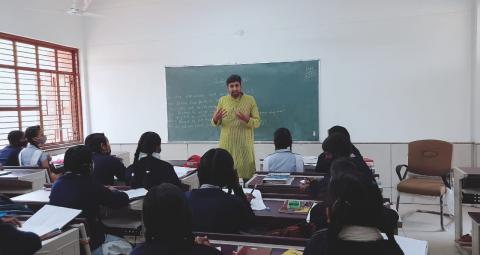
The indispensability of the board exam
Recalling my own experience of appearing in the board exam…
It was my 1st time seeing dozens of policemen in uniform with guns. They guarded the examination centre. Police jeeps with sirens kept disturbing the otherwise frightening silence of the examination hall. While we were writing on the answer sheet, we were startled to hear whistles. Then the stern voice of the invigilator warned us to be alert...flying squads were on the ground, our hands started shivering.
Meanwhile, an unknown fear surrounded us. A couple of minutes later, we saw a group of gentlemen entering the room, asking random students to stand and starting the body search. Answer Sheets and question papers were flipped through, handkerchiefs were uncovered and in between, we heard the coarse voice of an officer…' is room me do parka gaya'. We have caught two in this room. Later, the invigilator informed us...those two students were expelled. The moment the flying squad left the room, it brought some relief. We wiped our sweats, sipped some water and got back to writing our answers.
classroom
The scene in the city may be a little different but it hasn't changed much. Fear, in one form or other, is still attached to the board exams.
Even in the schools in the big cities, if you cross the corridors where board classes are arranged, you will experience a deafening silence. Often the principal makes the sitting arrangement for the board classes around her office, so that proximity to the authority may instil some permanent sense of fear in the mind of the students. Teachers teaching board classes often feel helpless and remind their students... Nothing is in our hand, you are facing board exams. This unnaturally transcends an intimate relation of teachers and students to a functional relation where they are engaged in a pursuit beyond their control. Although, often teachers unknowingly also become an accomplice in perpetuating the fear. They often miss understanding how this process snatches away the power of their agency.
The fear is not just limited to students and teachers; it transcends and reaches every home where a student is appearing in the board exam. Families cancel most of their fun activities, parents often take long leaves to ensure maximum support to their wards. All these tantrums are not for study, if it is so, the same rituals could have been performed in previous classes as well. As long as it was about the study, normal life and study co-existed. It's about fear, which changes all normal courses of behaviour.
So, is this whole debate around whether to cancel the Class 12 board examination, a way to propagate this paranoia or is there another reason behind it?
Let's connect it with an anecdote which I share with class 9th students from their History book...
(I have interjected few words in the bracket in the paragraph below)
"In pre-colonial times Maasai society was divided into two social categories – elders and warriors. The elders formed the ruling group and met in periodic councils to decide on the affairs of the community and settle disputes. The warriors consisted of younger people, mainly responsible for the protection of the tribe. They defended the community and organised cattle raids. Raiding(Education) was important in a society where cattle(Degree) was wealth. It is through raids(education) that the power of different pastoral(social) groups was asserted. Young men came to be recognised as members of the warrior class(citizen) when they proved their manliness by raiding the cattle of other pastoral groups and participating in wars. They, however, were subject to the authority of the elders.”
Board exams appear to be a ritual to accord the status in the society. Remember the phrase…' Matric Fail'
At the 10th class level, the state may still show some relaxation, but at the 12th level, board exams are the necessary rituals. It has very little to do with epistemic aspects of education, it's more about registering the presence of the state.
Immediately after the 12th class, most of the students turn 18 years and they become legitimate citizen who can participate in the electoral process. Though the state is omnipresent, it's present right from there when a child is conceived by her mother till the funeral pyre. At the age of 18, the state seems to be determined to bring its presence from subconscious to conscious state of thinking. And what is interesting to note is that 'fear' is at the centre of activating this consciousness.
Now the question arises why the state is so determined to conduct the board exams when fear of the pandemic has already engulfed the life of the people. Why has it become so indispensable?
Through the years states started ignoring their responsibility to make a provision for quality education. Dilapidated school buildings and non-appointment of teachers are visible (Delhi and few other states like Kerala and Andhra Pradesh have made huge investments in public education) evidence of how the state has forsaken its responsibility to make adequate provision for quality education. However, a state like Delhi which has invested in public education also finds the courage to speak about the futility of the board exam. Like the Adhar card, everyone goes through the institutions of education. The State is not left with any other option but to overemphasise examination. To the extent that education and examination become synonymous. It can be said that examination is the education. It brings an incredible opportunity for the state to register its presence in the mind of young adult.
( The word ‘state’ has been used to denote centre, state and government)
- Log in to post comments
